

The Mind-Blowing Athleticism of Simone Biles. Fu Yuanhui Teaches China to Relax at the Olympics. By official count, there are twenty-eight sports, three hundred and six events, and twenty-four hundred and eighty-eight available medals at this year’s Rio Olympics.
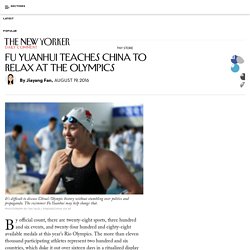
The more than eleven thousand participating athletes represent two hundred and six countries, which duke it out over sixteen days in a ritualized display of prowess that is as pricey as it is purposeless. There’s pro-forma talk of sportsmanship and international coöperation, but even the opening ceremony’s Parade of Nations lays bare the tribalism in us all: what counts here is the flag and the flash of gold. For the Chinese government, which in recent years has made no secret of its desire to promote China’s supremacy on the world’s most conspicuous athletic stage, the Olympics are closer to a gladiatorial contest than a sporting event. The task is to bring the motherland glory, and glory comes exclusively in one color. It’s difficult to discuss China’s Olympic tradition without stumbling over politics and propaganda.
For World’s Newest Scrabble Stars, SHORT Tops SHORTER. LAGOS—Nigeria is beating the West at its own word game, using a strategy that sounds like Scrabble sacrilege.
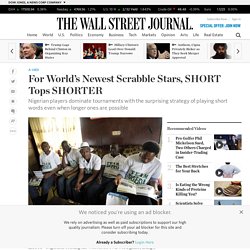
By relentlessly studying short words, this country of 500 languages has risen to dominate English’s top lexical contest. Last November, for the final of Scrabble’s 32-round World Championship in Australia, Nigeria’s winningest wordsmith, Wellington Jighere, defeated Britain’s Lewis Mackay, in a victory that led morning news broadcasts in his homeland half a world away. It was the crowning achievement for a nation that boasts more top-200 Scrabble players than any other country, including the U.K., Nigeria’s former colonizer and one of the board game’s legacy powers.
“In other countries they see it as a game,” said Mr. Jighere, now a borderline celebrity and talent scout for one of the world’s few government-backed national programs. Leicester’s Betting Line Was a 5,000-to-1 Blunder. London Ten months ago, British bookmakers set 5,000-to-1 odds on Leicester City winning the Premier League, hoping the price might convince a few optimists to make a silly bet.
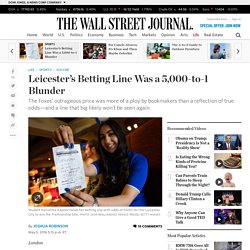
It didn’t mean they thought the Foxes had a one in 5,000 chance of finishing first. Rather, it was a way to rake in a little cash on something that would never happen. This week, it turned into one of the most glaring mistakes in sports betting history. Those odds, and the lucky few who took advantage of them, have cost U.K. betting houses around $15 million this season, according to their estimates. Learning from their losses, the bookmakers are determined to make sure it doesn’t happen again. “It is highly unlikely you will see 5000-to-1 for teams to win the Premier League next season or any time soon,” Ladbrokes spokeswoman Jessica Bridge wrote in an email. The Ugly Truth About Horse Racing - Andrew Cohen. There are essentially three types of people in horse racing.
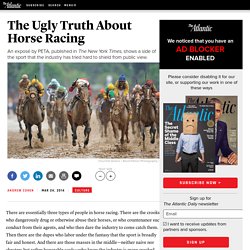
There are the crooks who dangerously drug or otherwise abuse their horses, or who countenance such conduct from their agents, and who then dare the industry to come catch them. Then there are the dupes who labor under the fantasy that the sport is broadly fair and honest. And there are those masses in the middle—neither naive nor cheaters but rather honorable souls—who know the industry is more crooked than it ought to be but who still don't do all they can to fix the problem. Michael Phelps rehab ahead of swimmer's last Olympics in Rio 2016 - Olympics. An abridged version of this story appears in the Nov. 16, 2015, issue of Sports Illustrated.

To subscribe, click here. For almost five days in the fall of 2014, the most decorated Olympian in history lay curled in a fetal position in his Baltimore home, crestfallen and fearful, embarrassed at his behavior and uncertain of his future. Over three Olympics, from 2004 through ’12, Michael Phelps had won 18 gold medals and 22 medals overall, each total more than anyone ever. His swimming had been transformed by NBC into a nightly television miniseries, and millions watched as Phelps splashed to victories for America over the rest of the world.
His family watched at poolside, supporting players in an emotional drama that was the paradigm of Olympic success and Olympic packaging. His life had been turned into a flat-screen American athletic dream: A skinny boy with big feet (and ears) had been transformed by endless laps and a wise coach into a red-white-and-blue, gold-medal-winning machine. The bat wars. Where the Mets Found New Fans in 2015. Most popular team on Facebook from 2009 to 2014 Since April 1, 2015 When we published a national map of baseball fandom last year, based on Facebook data, it contained a painfully sad fact for Mets fans: In every ZIP code across every borough of New York, the Yankees were more popular than the Mets.

Roger Federer as Religious Experience - Tennis. The Moments are more intense if you’ve played enough tennis to understand the impossibility of what you just saw him do.
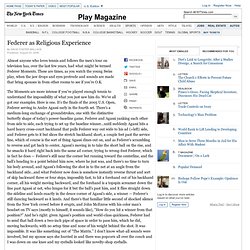
We’ve all got our examples. Here is one. It’s the finals of the 2005 U.S. Open, Federer serving to Andre Agassi early in the fourth set. Anyway, that’s one example of a Federer Moment, and that was merely on TV — and the truth is that TV tennis is to live tennis pretty much as video porn is to the felt reality of human love. Journalistically speaking, there is no hot news to offer you about Roger Federer.